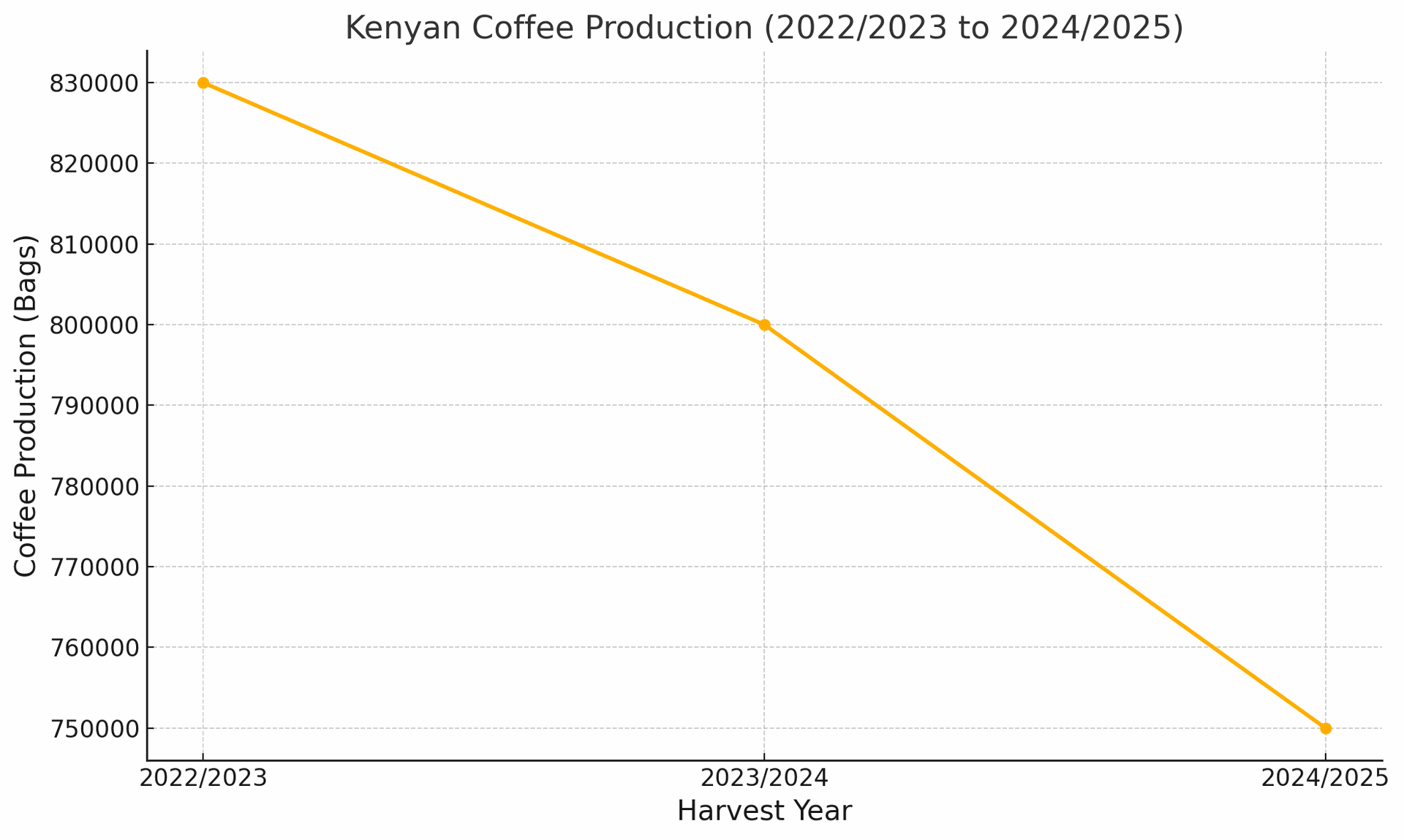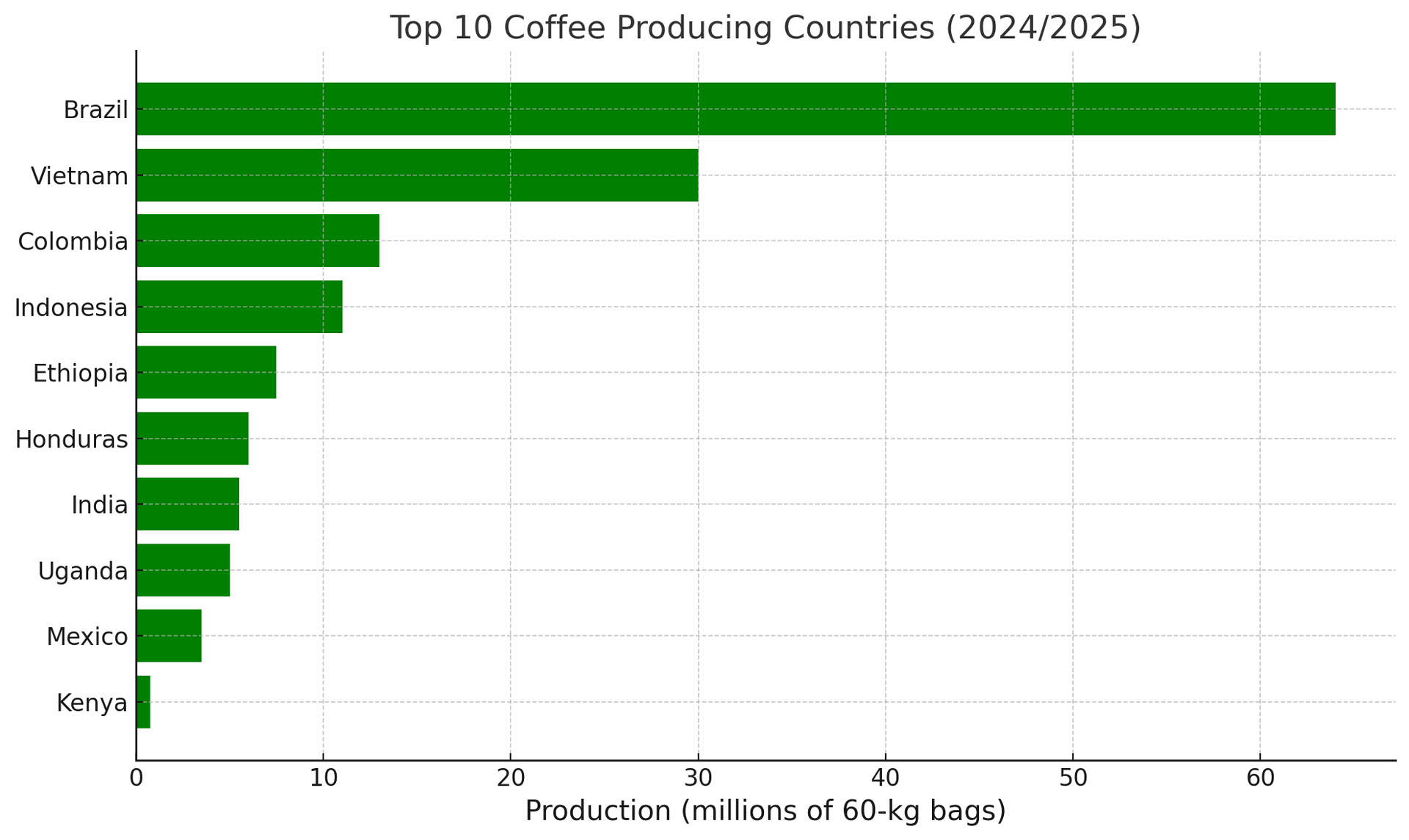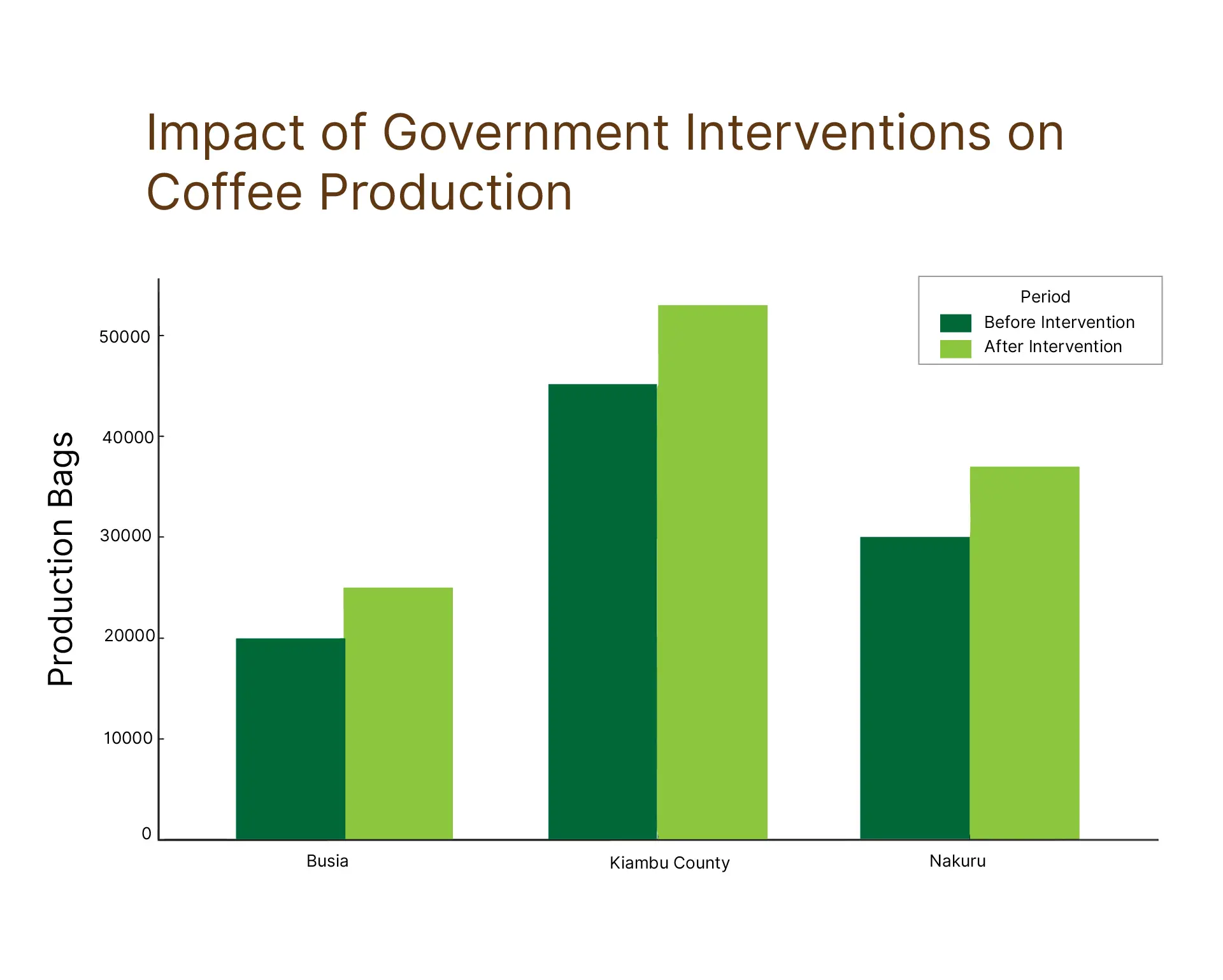Kenyan coffee, renowned for its bright acidity and rich flavors, has long been a favorite among coffee connoisseurs worldwide. However, beneath the surface of your morning brew lies a story of resilience, challenges, and transformation.
Historical Overview
Coffee farming in Kenya traces back to the early 20th century, when the British colonial government introduced coffee from Ethiopia into the fertile highlands of Kenya. In the 1920s and 1930s, Kenyan farmers quickly embraced this new crop, drawn by its promise of prosperity and the prestige it held in global markets. Lush volcanic soils and ideal growing conditions in the highlands fueled a coffee boom that lasted for decades. By the early 1990s, Kenya’s annual coffee production consistently reached around 1.2–1.3 million 60-kg bags (about 72,000–78,000 metric tons), ranking it among the top African coffee producers. Coffee was the third-largest foreign exchange earner in the country, bolstering rural economies and inspiring optimism in farming communities. More than 700,000 smallholder farmers were actively engaged in coffee production, organized in robust cooperative networks that powered this golden era.
Smallholders like my parents Stephen and Margaret Kuria , newly independent from British control, saw coffee as a golden ticket to financial independence and community development. Yet, the story of coffee in Kenya is also a story of evolving challenges. From the height of optimism and economic growth, the sector has faced an uphill battle in recent years. As we shift to the present day, we’ll explore the causes behind the current production decline, the resilience of Kenyan farmers, and what Solai Coffee is doing to foster fair trade and direct-market access in the face of these challenges.
Current State of Coffee Production in Kenya
Kenya’s 2024/2025 coffee season ran from October 2024 through September 2025, yielding approximately 750,000 bags (45,000 MT) of green coffee—a 6.3% decline compared to the previous season’s ~800,000 bags (48,000 MT) . While yield dipped, bean quality remained high thanks to favorable cherry-development weather.

Why Coffee Production Is Declining in Kenya
Globally, coffee production is facing unprecedented challenges. Climate change, characterized by rising temperatures and erratic weather patterns, is reducing suitable land for coffee cultivation and increasing the prevalence of pests and diseases. Economic pressures, including fluctuating market prices and rising production costs, further strain the industry.

In Kenya, these global issues are compounded by local factors such as limited access to quality inputs, outdated farming practices, and a lack of support for smallholder farmers. Here are the main factors affecting the decline.
- Stagnating Planted Area & Input Disruptions
Slow farm expansion and challenges accessing fertilizers, seedlings, and agronomic inputs have depressed yields Kenya Coffee Production - Climate Change Impacts
Erratic rainfall patterns, prolonged droughts, and rising temperatures weaken plant health and fruit development; cyclic droughts recur roughly every decade, most recently in 2024 - Pests & Diseases
Increases in coffee berry disease, berry borer, and leaf rust—exacerbated by warmer, more humid conditions—force reliance on costly or harmful pesticides. - Economic Pressures
Fluctuating global coffee prices and rising agro-input costs (fertilizer, labor) squeeze smallholders’ margins; many earn under $2.30/day, risking farm abandonment. - Weak Sector Systems
Sub-optimal extension services, underfunded cooperatives, and opaque supply chains limit farmers’ market power and discourage reinvestment.
Why we should care
What does this mean for the future of your favorite coffee? If these changes continue, coffee production will decrease, making coffee more expensive and less accessible.

Government Intervention to Address the Decline
Recognizing the urgent need to revitalize Kenya’s coffee sector, the government has stepped in with a range of interventions, from policy reforms and cooperative support to replanting programs and extension services. Despite these efforts, several entrenched challenges continue to weigh down production and farmer livelihoods.
- Free Seedling Distribution
The Ministry of Agriculture rolled out free, disease-resistant seedlings in key counties (e.g., Busia) to rejuvenate ageing farms Standard Media.
- Coffee Sector Reforms
Under the Coffee Bill 2020 and subsequent Coffee Act revisions, the government is establishing a Kenya Coffee Council, mandating transparent pricing boards, and encouraging private investment in processing infrastructure
- Regenerative Agriculture Programs
Public–private partnerships (e.g., AFA’s sustainable coffee initiative) promote soil health through composting, cover crops, and agroforestry, boosting long-term productivity
- Cooperative Strengthening
Farmer cooperatives receive training in governance, financial management, and quality grading to secure better export premiums and reduce middlemen losses

Transforming Farming Through Direct Trade: The Solai Coffee Model
At Solai Coffee, our mission transcends delivering exceptional coffee; it's about cultivating a sustainable ecosystem that empowers our farmers and enriches our community. Our farm-direct business model is the cornerstone of this transformation, ensuring that the benefits of every cup extend back to the hands that nurtured the beans.
- Empowering Farmers with Fair Compensation
By eliminating unnecessary intermediaries, we ensure that a larger share of the profits returns directly to our farmers. This equitable distribution enables them to:
- Reinvest in Their Farms: With increased earnings, farmers can purchase quality inputs, adopt better farming practices, and enhance their yields and coffee quality.
- Support Their Families: Improved income stability allows for better access to healthcare, education, and overall well-being.
- Investing in Agricultural Excellence
We believe that knowledge is as vital as resources. Our investments include:
- Hiring Agronomists: Providing expert guidance on sustainable farming techniques, pest management, and crop diversification.
- Training Programs: Educating farmers on modern coffee farming practices to improve productivity and environmental stewardship.
- Nurturing the Next Generation
Recognizing the importance of youth in agriculture, we:
- Encourage Youth Participation: Creating opportunities and demonstrating that farming can be a viable and rewarding career path.
- Integrate Technology: Introducing modern tools and practices to make farming more appealing to younger generations.
- Strengthening Community Through Education
Our commitment to community development is exemplified by our support for local education:
- Nyakinyua Primary School Partnership: In collaboration with Acts of Wisdom, we've provided essential resources, including laptops, sanitary products, and learning materials, to enhance the educational environment .
- Infrastructure Development: Assisting in rebuilding efforts and improving facilities to create a conducive learning atmosphere.
- Sharing Our Journey
Transparency and connection are at the heart of our operations:
- Meet the Farmer Events: Hosting events and farm tours that allow consumers to engage directly with the farmers, fostering a deeper appreciation for the coffee journey.
- Storytelling Platforms: Utilizing social media and blogs to share the narratives of our farmers, their challenges, triumphs, and the impact of your support.
How You Can Help Save Coffee in Kenya
Kenya's coffee industry, renowned for its high-quality Arabica beans, is facing significant challenges, including declining production due to climate change, economic pressures, and systemic issues within the sector. As consumers, your choices can have a profound impact on the livelihoods of smallholder farmers and the sustainability of coffee production in Kenya. Here's how you can make a difference
- Choose Direct-Trade Brands: Purchase from companies like Solai Coffee that pay premiums and invest directly in farmers.
- Advocate & Share: Use your social channels to raise awareness and help keep our stories alive.
- Support Regenerative Practices: Opt for coffees that are traceable and highlight the farmers' transformation to address global warming.
- Donate or Volunteer: Contribute to cooperatives or NGOs fostering tree-rehabilitation and farmer education programs.
- Raise Your Voice: Urge policymakers to enforce transparent pricing boards and invest in extension services.
By taking these steps, you not only enjoy exceptional coffee but also contribute to a more equitable and sustainable future for Kenyan coffee farmers.
Join us in our mission to rejuvenate Kenyan coffee farming. Support direct-trade practices, share our story, and be a part of the change. Together, we can ensure a sustainable future for Kenyan coffee.
Kenya’s Coffee Journey: From Colonial Roots to Modern Challenges